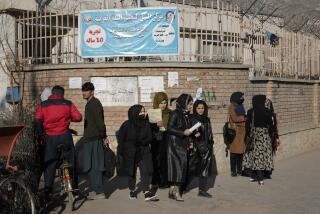Pilots, Mechanics : Britain Bars 336 Libyans From Studies
- Share via
LONDON — The government Friday barred more than 330 Libyan student pilots and airplane mechanics from continuing their studies, citing a risk to national security, and put 22 other Libyan students on a flight out of the country.
The government said that about 16 Libyans studying to be pilots and about 320 studying airline maintenance would be affected by the new order. It said they would be expected to leave the country when their visas expire in a few months.
The 22 Libyans expelled Friday had been detained earlier in the week for alleged revolutionary activity. They included a student pilot who reportedly offered to form suicide squads to attack U.S. targets.
Fists and Slogans
They were escorted aboard a Libyan Arab Airlines Boeing 727 by police with submachine guns.
They shook their fists and chanted slogans against President Reagan and British Prime Minister Margaret Thatcher as they walked from police vans to the plane at Heathrow Airport.
The group arrived back in Tripoli, Libya, Friday night. At a government-arranged press reception, they denied subversive activities and complained that their expulsion had unfairly ruined their careers.
Before leaving London, a member of the Libyan plane crew handed out posters and post cards showing Libyan leader Col. Moammar Kadafi with his adopted 15-month-old daughter, who doctors and officials in Libya say was killed in the April 15 U.S. air raid.
‘Reagan Killed Me’
“Daddy, you loved me, Reagan killed me,” said the caption on one of the post cards.
Thatcher backed the raid and allowed U.S. planes based in Britain to take part.
Her government did not order the approximately 336 Libyans affected by Friday’s order to leave immediately, but it barred them from working on airplanes or being in airports.
“The effect of these measures will be that such trainees will be unable to complete their courses or obtain qualifications,” Thatcher said in a written statement to the House of Commons. “In that event, their current basis of stay will no longer exist and they will be expected to leave.”
Thatcher said the government would deport the aviation students if they failed to leave voluntarily.
Meanwhile, other West European countries moved to implement a Common Market decision to reduce the size of Libyan embassies in their countries in response to suspected Libyan involvement in international terrorism.
Spain Expels Libyans
Spain ordered the Libyan commercial attache to Madrid and two Libyan embassy administrators to leave the country “for taking part in activities incompatible with their functions.” It also ordered eight Libyan teachers and students to leave “because of their relation to activities contrary to state security.” It did not elaborate on the allegations.
France said it planned to begin reducing the number of Libyan diplomatic personnel, but did not give a specific number. It also restricted Libyan embassy employees in Paris and Libyan consular employees in Marseilles to those metropolitan areas and said Libyan visa applications will be scrutinized more carefully.
West Germany and Denmark ordered reductions in the size of the Libyan embassies in their capitals earlier this week.
After one Libyan student pilot, Adel Masaoud, 23, allegedly offered to form suicide squads to attack U.S. targets, Thatcher’s government banned Libyans from flying solo in Britain.
Training at Airports
But there was pressure from Parliament to end all training of Libyans for airline work since much of training takes place at major airports.
The Transport Department said the new order affected students at five aircraft maintenance schools and three main private flying schools. The department also circulated an order banning Libyans from smaller flying schools and private flying clubs.
“I don’t think the public would understand it if we allowed Libyans to train on civilian aircraft . . . which may be going into service the day after they have finished with them,” Transport Secretary Nicholas Ridley told the British Broadcasting Corp. “There is always a risk there.”
He added, “I fear reluctantly this must be done for security reasons.”
Terrorist Acts
Thatcher told Parliament in a statement Thursday night that Libya has been involved in terrorist acts in Britain since 1980, including supplying the Irish Republican Army and bombings in London and Manchester in March, 1984.
Newspapers reported that authorities suspected Libya or its agents were behind Thursday’s bombing of a British Airways office in London. However, the Home Office said no evidence was found to connect Libya with the bombing.
Britain broke relations with Libya in 1984 after a London policewoman was killed by gunfire from the Libyan Embassy.
More to Read
Sign up for Essential California
The most important California stories and recommendations in your inbox every morning.
You may occasionally receive promotional content from the Los Angeles Times.













